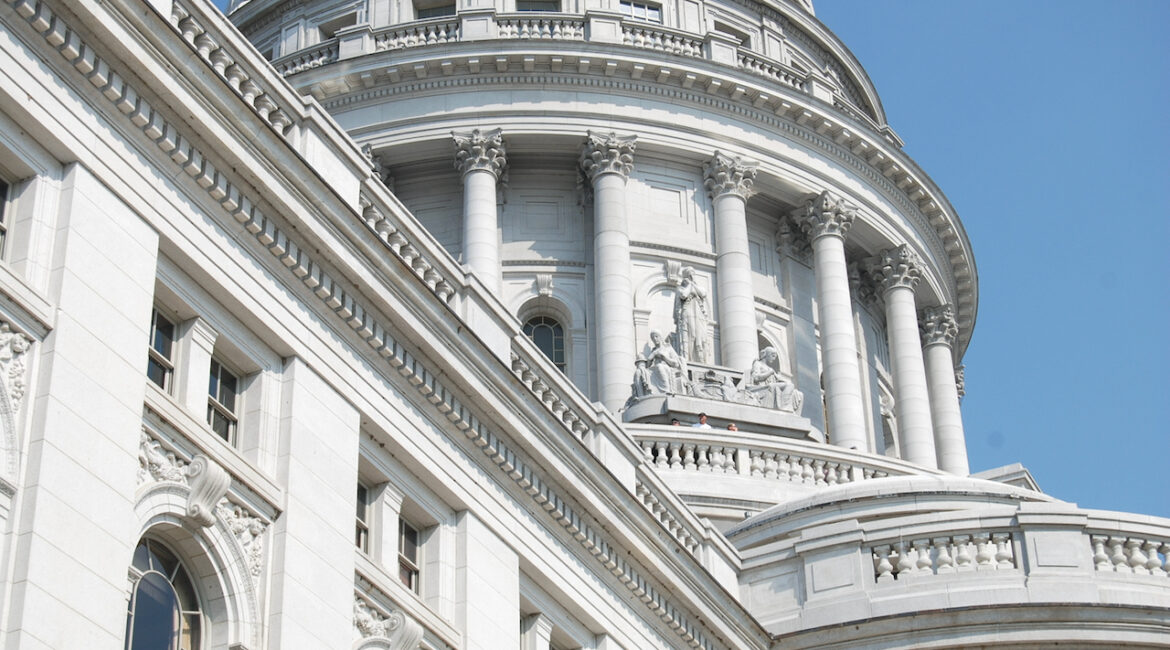By Kim McDarison
A final step to turn two shared revenue bills into law remains after both chambers of the Wisconsin Legislature — the Assembly and the Senate — voted on Wednesday in favor of the measures, which will, among other changes, increase state aid to municipalities, known as “shared revenue,” by 20%.
According to Mike Mikalsen, chief of staff serving in the office of State Sen. Steve Nass, the two bills, Assembly Bill (AB) 245 and Senate Bill (SB) 330 have been directed to the governor’s office. The governor, upon their receipt, has six days to decide if he will sign the bills, Mikalsen said, adding that the governor has indicated that he is “likely” to sign them.
Nass, R-Whitewater, represents State Senate District 11, which includes the cities of Fort Atkinson and Whitewater.
What’s in the bills?
Information released by the governor’s office on Thursday, June 8, noted that the bills also included at least six new provisions which would impact K-12 funding.
Evers noted that the bill, which he called a “compromise with the GOP,” includes more than $1 billion for K-12 education, $30 million in school-based mental health services, and a 20% increase in support to local communities statewide.
Last Thursday, according to the release, Evers, Senate Majority Leader Devin LeMahieu, R-Oostburg, and Assembly Speaker Robin Vos, R-Rochester, reached a tentative compromise regarding shared revenue, which the release described as “one of the most significant sources of funding provided by the state to local governments.” The agreement, the release stated, was contingent upon several provisions, including “a historic investment in K-12 schools and education.”
The release noted that the 20% increase in shared revenue as outlined in the agreement would be used to support “communities of every size statewide.”
“For too long, our communities have been asked to do more with less, and this agreement is critical to ensure our local partners have the resources they need to meet basic and unique needs alike. After working through much of last night (Wednesday, June 7), I have reached a tentative agreement with both Majority Leader LeMahieu and Speaker Vos on major provisions of a compromise on shared revenue that will mean historic increases in support for our local communities across Wisconsin,” Evers was quoted as saying within the release.
“This compromise will be transformative for our communities and our state, and coming to an agreement in principle on major parts of this proposal is a significant milestone in my negotiations with Republican leaders over the past few months,” Evers continued.
According to the release, the agreement makes investments in K-12 education statewide by:
• Providing more than $1 billion in spendable revenue for K-12 education to maintain two-thirds funding, including a $325 per pupil increase in each fiscal year on revenue limits;
• Setting aside $50 million to improve reading and literacy outcomes for K-12 students (details for exact implementation of the funding have not yet been determined);
• Providing a per pupil aid increase for choice and independent charter schools;
• Investing $30 million over the biennium to continue the governor’s initiative to support school-based mental health services statewide;
• Reaching 33.3% reimbursement for special education, and
• Increasing the low revenue ceiling from $10,000 to $11,000 per student.
Within the release, Evers stated: “What’s best for our kids is what’s best for our state, and I will never stop trying to do the right thing for our kids. This compromise ensures we make a historic investment in this budget for K-12 schools and education, providing more than $1 billion that can be used for our kids in the classroom, while also working to improve literacy and reading outcomes and support school-based mental health services statewide.”
According to information provided through a legislative memo, proposed 2024-25 supplemental aid payments to municipalities are as follow: in the city of Fort Atkinson, the bill, once signed into law, is anticipated to bring a 32.5%, or a $309,933, increase to existing municipal aid of $954,375, producing total aid of $1.264 million.
In the city of Whitewater, the bill, once signed into law, is anticipated to bring a 14.6%, or a $414,560, increase to existing municipal aid of $2.83 million, producing total aid of $3.25 million.
Looking at proposed shared revenue increases for counties, in Jefferson, existing aid of $1.17 million is anticipated to increase by $817,790, for a 2024-25 total of $1.99 million.
In Walworth County, existing aid of $100,182 is anticipated to increase by $1.22 million, for a new fiscal 2024-25 total of $1.32 million.
Charts itemizing proposed increased for individual school districts are not yet available, Mikalsen said.
A document in which a breakdown by county and municipality can be found, is here: https://docs.legis.wisconsin.gov/misc/lfb/bill_summaries/2023_25/0245_ab_245_relating_to_local_government_programming_and_funding_personal_property_tax_repeal_and_city_and_county_of_milwaukee_sales_and_use_tax_authority_and_pension_systems_5_16_23.pdf.
How did local representatives vote?
According to the Wisconsin State Legislature’s website, AB245 was presented to the governor on June 14, by directive of the speaker, and passed in the Assembly by a vote of 68-26. State Rep. Scott Johnson, who represents Assembly District 33, which includes Fort Atkinson and the portion of Whitewater which resides in Jefferson County, voted in favor of the bill. State Rep. Ellen Schutt, R-Clinton, who represents Assembly District 31, including the portion of Whitewater residing in Walworth County, also voted in favor of the measure.
AB245 was passed in the Senate by a vote of 21-12, with Nass voting against the bill.
According to a “Wisconsin Legislative Council Amendment Memo,” the bill: (1) modifies the state’s approach to shared revenue for counties and municipalities; (2) repeals Wisconsin’s personal property tax; and (3) authorizes the city of Milwaukee and Milwaukee County to impose sales and use taxes, primarily to address the city’s and county’s unfunded pension system liabilities. The bill also makes other changes to state law, including some provisions specific to the city of Milwaukee and Milwaukee County and other provisions that apply throughout the state.
The full legislative memo is here: https://docs.legis.wisconsin.gov/2023/related/lcamendmemo/ab245.pdf.
The full bill, AB245, is here: https://docs.legis.wisconsin.gov/2023/proposals/ab245.
According to the Wisconsin State Legislature’s website, SB330 was presented to the governor on June 14, by directive of the majority leader. After undergoing three readings, the bill passed in the Senate by a vote of 24-9. Nass voted in favor of SB330.
The bill passed in the Assembly by a vote of 62-31. Johnson and Schutt each voted in favor of the bill.
The full Senate bill, SB330, is here: https://docs.legis.wisconsin.gov/2023/proposals/sb330.
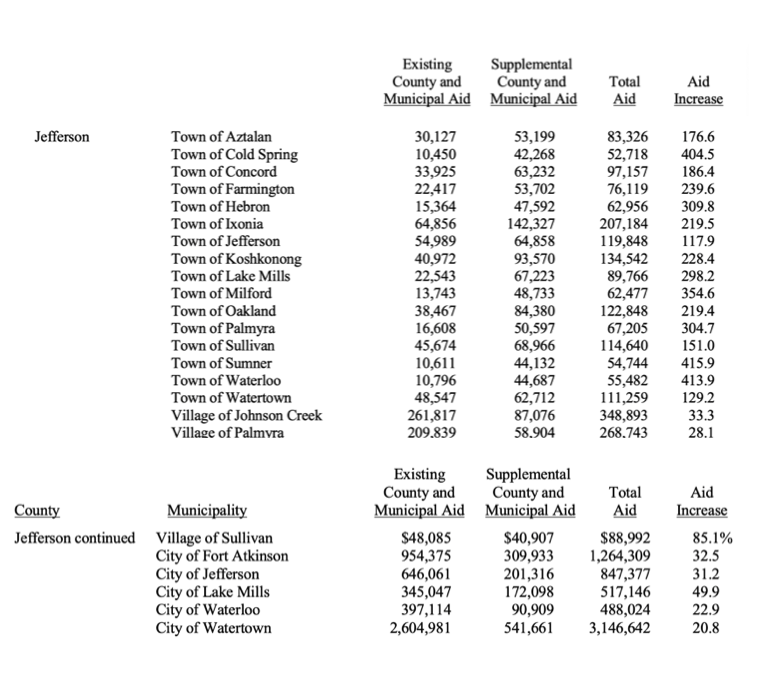
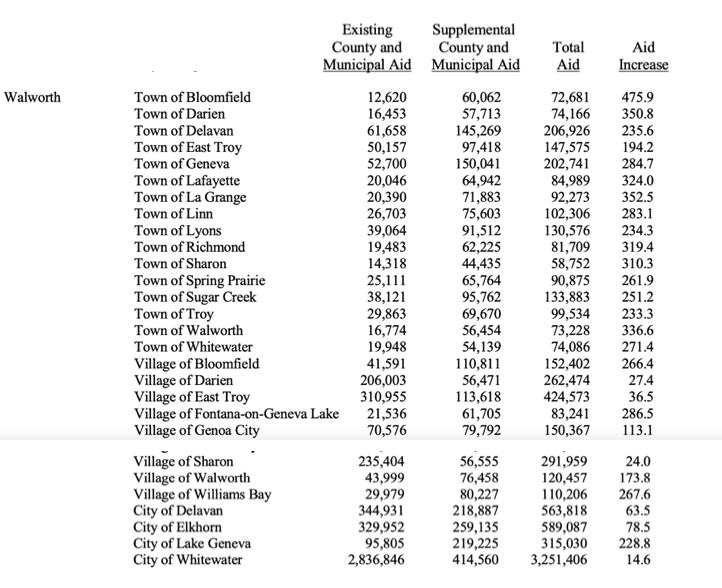
Two charts above: proposed 2024-25 supplemental aid as provided in a legislative memo is shown for municipalities within Jefferson County, at top, and Walworth County, above. The legislative document, showing the proposed supplemental aids for all municipalities and counties statewide, is here: https://docs.legis.wisconsin.gov/misc/lfb/bill_summaries/2023_25/0245_ab_245_relating_to_local_government_programming_and_funding_personal_property_tax_repeal_and_city_and_county_of_milwaukee_sales_and_use_tax_authority_and_pension_systems_5_16_23.pdf. Charts showing a breakdown of proposed supplemental aid by school districts are not yet available, according to a spokesperson in State Sen. Steve Nass’ office.
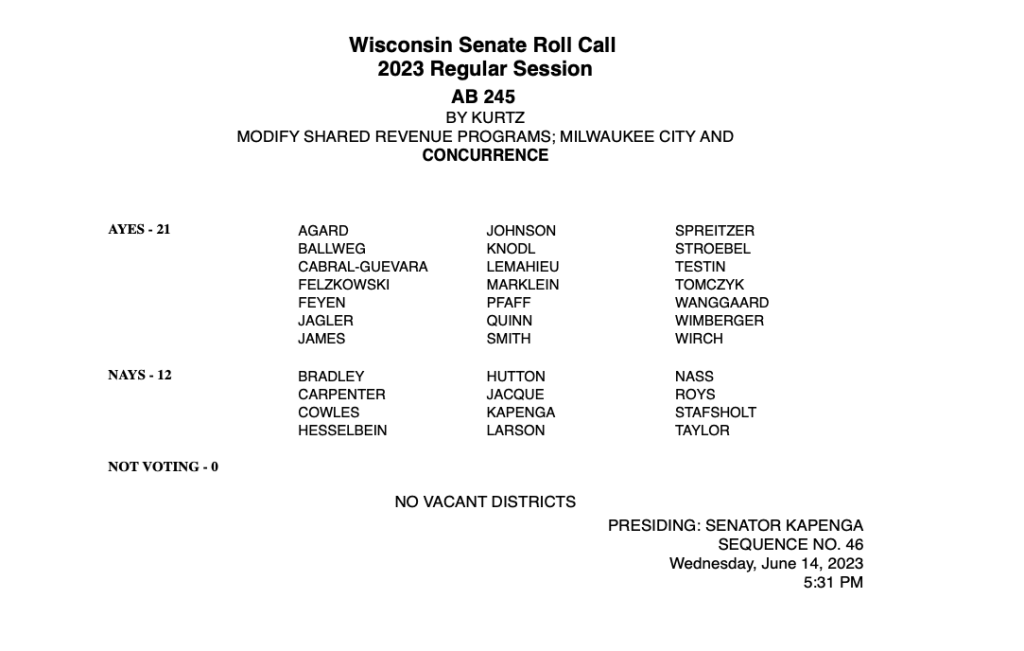
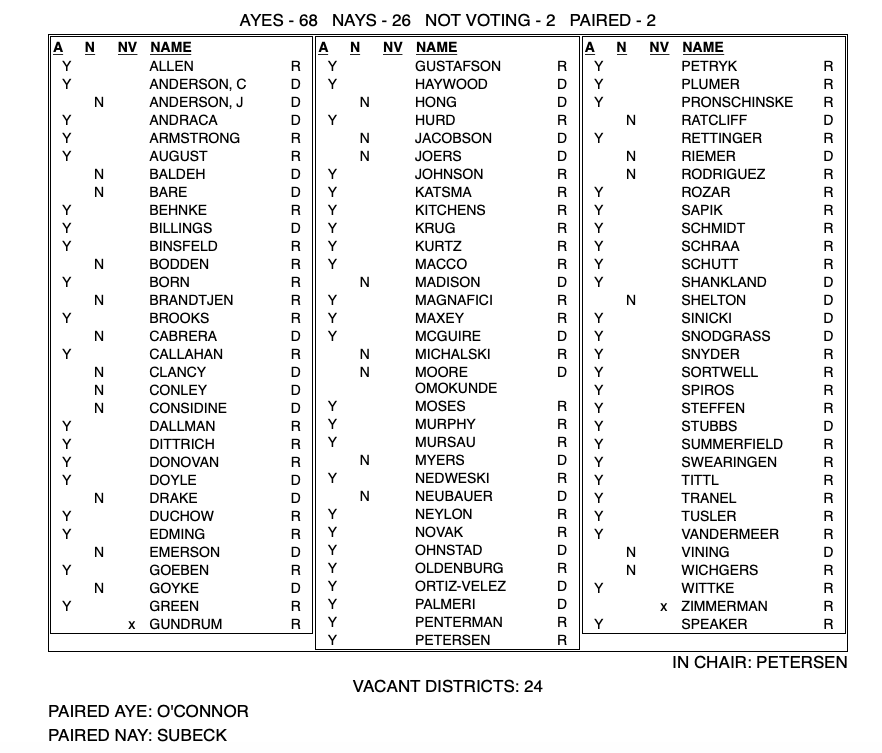
Two charts above: As shared on the Wisconsin legislative website, a chart, at top, shows which members of the Senate voted for and against AB245. The measure passed the Senate by a vote of 21-12, with Sen. Steve Nass among those voting against the measure. Above, a chart shows which members of the Assembly voted for and against AB245. The measure passed by a vote of 68-26, with Reps. Scott Johnson and Ellen Schutt each voting in favor of the measure.
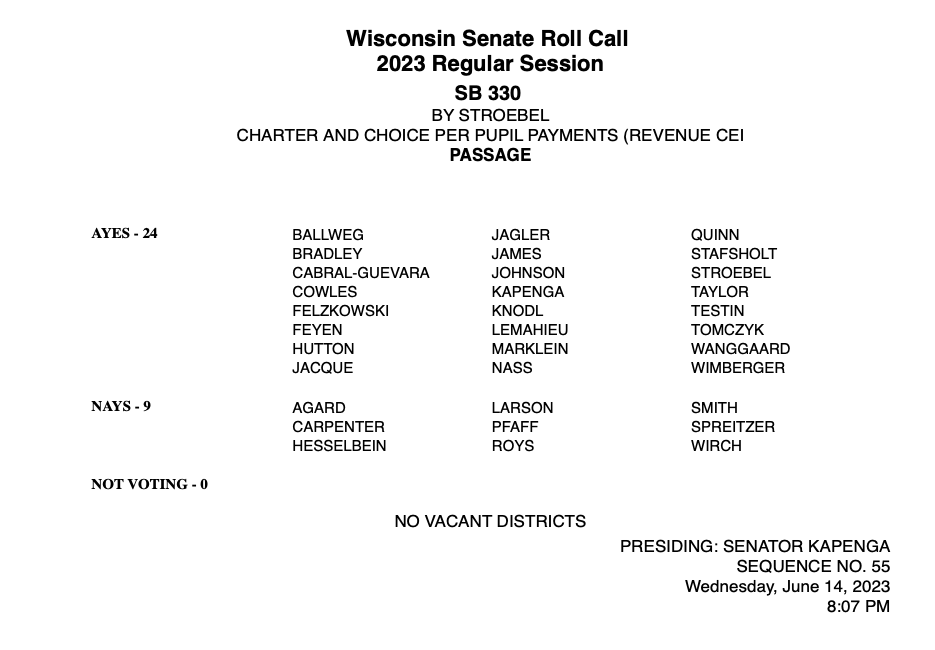
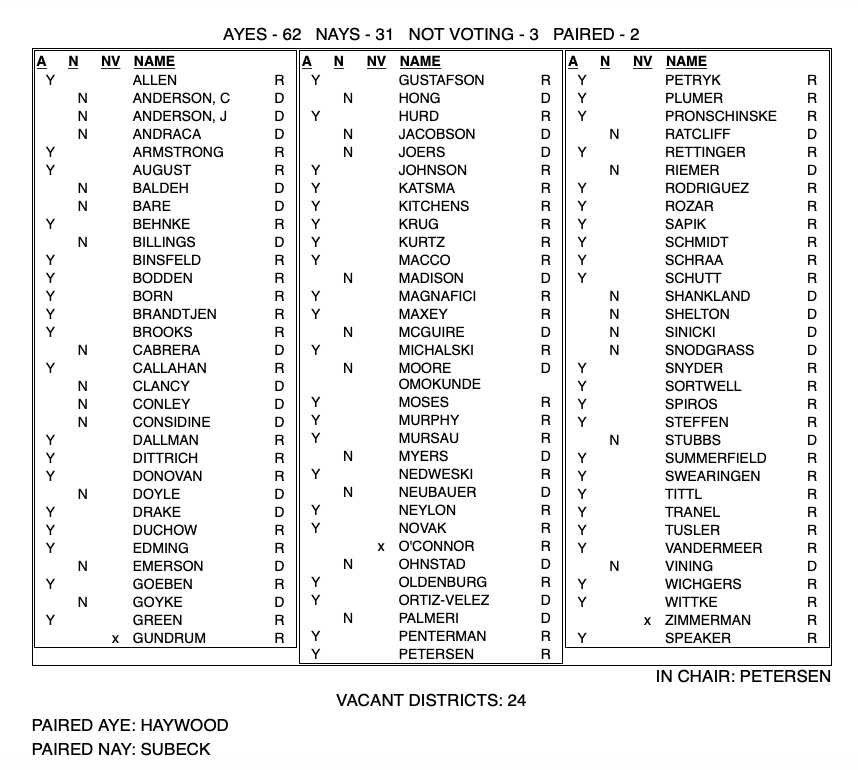
Two charts above: As shared on the Wisconsin legislative website, a chart, at top, shows which members of the Senate voted for and against SB330. The measure passed the Senate by a vote of 24-9, with Sen. Steve Nass among those voting in favor the measure. Above, a chart shows which members of the Assembly voted for and against SB330. The measure passed by a vote of 62-31, with Reps. Scott Johnson and Ellen Schutt each voting in favor of the measure.
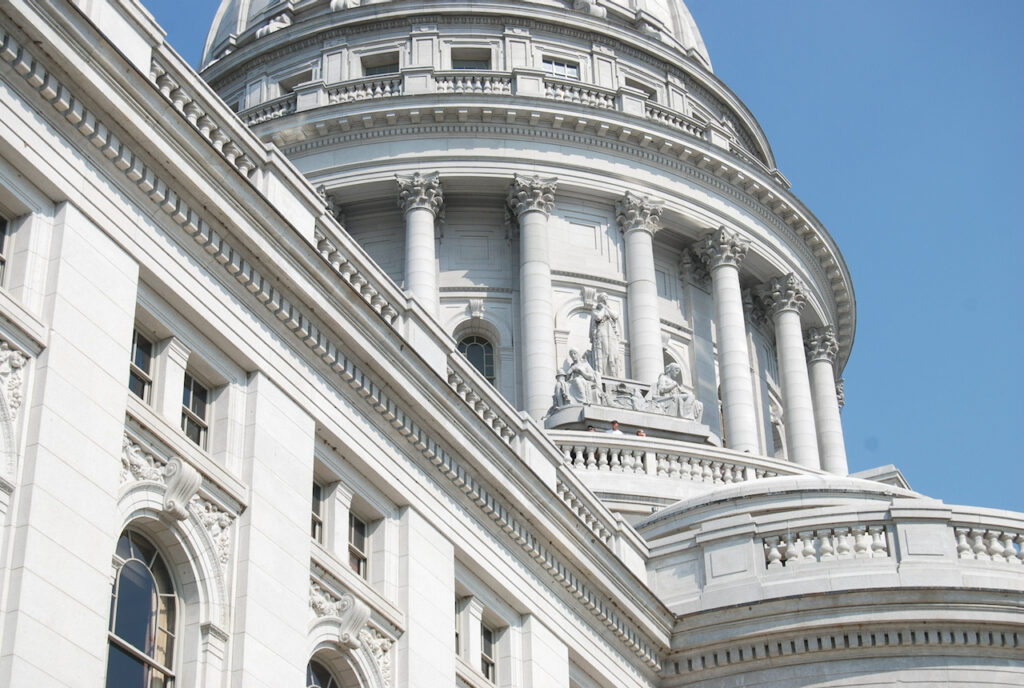
The Wisconsin State Capitol, file photo/Kim McDarison.
This post has already been read 2596 times!
